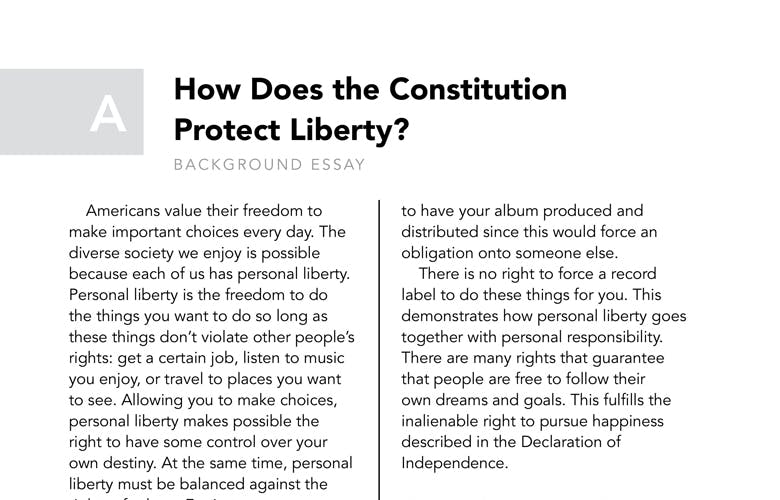Handout A: How Does the Constitution Protect Liberty? (Background Essay)
Americans value their freedom to make important choices every day. The diverse society we enjoy is possible because each of us has personal liberty. Personal liberty is the freedom to do the things you want to do so long as these things don’t violate other people’s rights: get a certain job, listen to music you enjoy, or travel to places you want to see. Allowing you to make choices, personal liberty makes possible the right to have some control over your own destiny. At the same time, personal liberty must be balanced against the rights of others. For instance, your personal liberty does not give you the right to blast music on someone else’s property or try to force an unwilling person to be your best friend.
Do You Have a Right to Force Others to Act?
You have a right to free speech. You do not, however, have the right to force anyone to listen to you. The right to speak does not include the right to be heard. Similarly, you have the right to write songs and record them. Without violating a person’s rights, it is not possible for one adult to stop another from making his or her own music. Yet no one has the right to be given a record contract. You don’t have a right to have your album produced and distributed since this would force an obligation onto someone else.
There is no right to force a record label to do these things for you. This demonstrates how personal liberty goes together with personal responsibility. There are many rights that guarantee that people are free to follow their own dreams and goals. This fulfills the inalienable right to pursue happiness described in the Declaration of Independence.
What Rights Does the Ninth Amendment Protect?
The Bill of Rights was added to make sure the federal government did not take away citizens’ rights. But adding the amendments was debated greatly. It would be impossible to list every right. Federalists of the 1780s worried that listing some rights might mean that others would be thought of as less important. To prevent this, the Ninth Amendment was included in the Bill of Rights.
The Ninth Amendment states that people have unenumerated rights, or rights not listed in the first eight amendments or elsewhere in the Constitution. Of course, this often creates as many questions as it answers.
Among the rights listed in the first eight are speech, religion, property and others. What rights does the Ninth Amendment protect? It does not say. The Ninth Amendment’s broad scope helps defend personal liberty. Many people believe that where the Constitution does not specifically list a particular right, it should be left to the people and their elected officials to determine whether a right exists. This raises the issue of balancing personal liberty with democracy.
How Do the First Eight Amendments Protect Personal Liberty?
Sometimes the Supreme Court decides that the listed rights imply the existence of a right that is not specifically listed. A famous example of this is the right to privacy. The First Amendment guarantees that you can associate with whomever you choose. The Third and Fourth Amendments promise that the government cannot intrude into your home without legal cause. The Fifth Amendment assures that you can keep silent if accused of a crime. Together, these rights protect citizens’ private actions. The Supreme Court first identified and labeled this right “privacy” in Griswold v. Connecticut (1965). The right to privacy is involved in many issues of personal liberty including contraception, abortion, gay rights, and drug testing of students, athletes, and workers.
What Does Due Process Mean?
The Ninth Amendment alone has rarely been used to claim unenumerated rights. The Fifth and Fourteenth Amendments are important to protecting personal liberties like property and contracts. The Fifth and Fourteenth Amendments protect the individual’s right to due process. Due process entitles all citizens to fair treatment by the government. For instance, the government cannot skip part of a trial or take your property away from you without compensating [paying] you for your loss because doing these things would violate due process. Due process also means that the law itself must be constitutional. Due process rights protect personal liberty because they check government power. Lawmakers must write legislation that respects individual rights, and those laws must be enforced fairly. One thing is certain: personal liberties are among the most hotly debated issues today.
What kind of government involvement in peoples’ lives is appropriate? The question raises issues that affect personal liberty.
Comprehension Questions
- How do the rights in the Bill of Rights protect liberty? Why did the Founders list these rights in the Bill of Rights?
- Why is due process protected in more than one amendment? What due process rights are protected?
- Explain why the limits on rights in the following passage are important and how they are related to liberty:
“You have a right to free speech. You do not, however, have the right to make anyone listen to you. The right to speak does not include the right to be heard…This principle demonstrates how personal liberty goes hand in hand(goes together) with personal responsibility. There are no rights in the Bill of Rights that require others to act on your behalf.”
